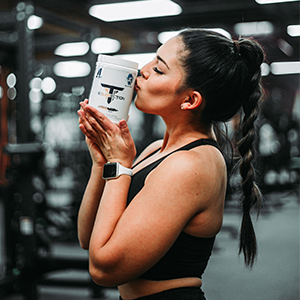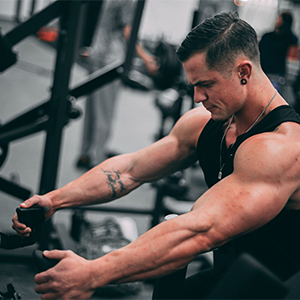How Much Protein Do You Need for Weight Loss?
Introduction
Embarking on a weight loss journey? One of the most important nutrients to focus on is protein for weight loss. Protein is not just for bodybuilders—it plays a crucial role in managing hunger, boosting metabolism, and preserving muscle mass. But how much protein for weight loss do you actually need? Let’s break it down so you can optimize your diet for effective fat loss.

Why Protein is Essential for Weight Loss
Protein Enhances Satiety and Reduces Appetite
Protein keeps you feeling full longer, reducing unnecessary snacking. Protein and satiety go hand in hand, making it easier to maintain a calorie deficit. High-protein meals slow digestion and regulate appetite-controlling hormones, helping you eat fewer calories naturally.
Protein Boosts Metabolism and Energy Expenditure
A high-protein diet increases calorie burning through the thermic effect of food. This means your body burns more calories digesting protein than it does carbs or fats. More protein and metabolism support steady energy levels and increased calorie expenditure.
Protein Preserves Muscle Mass During Weight Loss
Losing weight without losing muscle? That’s the goal! Protein to build muscle and lose fat is essential because when you cut calories, your body may break down muscle for energy. A high-protein diet for weight loss ensures that your body primarily burns fat while maintaining lean muscle mass.
Determining Your Protein Needs for Weight Loss
Factors Influencing Protein Requirements
Your protein intake for fat loss depends on your weight, activity level, and overall goals. Athletes or individuals who engage in strength training need more protein than those with a sedentary lifestyle.
Recommended Daily Protein Intake for Fat Loss
For effective protein requirements for weight loss, most experts recommend consuming 1.2 to 1.6 grams of protein per kilogram of body weight. For example, a person weighing 70kg (154 lbs) should aim for 84-112 grams of protein daily.
Calculating How Much Protein You Need for Weight Loss
To determine how much protein for weight loss is ideal for you, multiply your weight in kilograms by 1.2-1.6. This personalized approach ensures you get enough protein to sustain muscle and promote fat loss.
Incorporating Protein into Your Weight Loss Diet
Choosing High-Protein Foods for Weight Loss
For the best protein for weight loss, focus on:
-
Lean protein sources: Chicken breast, fish, turkey, egg whites
-
Plant-based proteins: Lentils, chickpeas, quinoa, tofu
-
Dairy: Greek yogurt, cottage cheese, low-fat milk
-
Protein powder: A convenient supplement for busy days
-
Protein snacks: Nuts, protein bars, hard-boiled eggs
Planning a High-Protein Diet for Effective Weight Loss
A protein for weight loss diet should include a mix of whole foods and protein-rich snacks. Example meal plan:
-
Breakfast: Scrambled eggs with spinach and whole-grain toast
-
Lunch: Grilled chicken salad with quinoa and avocado
-
Dinner: Salmon with roasted vegetables
-
Snacks: Greek yogurt with berries, a handful of almonds
Timing Protein Intake to Build Muscle and Lose Fat
Distribute protein and meal replacement shakes or whole food sources evenly throughout the day. Consuming protein post-workout aids in muscle recovery and growth, making it essential for those incorporating exercise into their protein and fitness goals.
Benefits and Considerations of a High-Protein Diet
Advantages of a High-Protein Diet for Weight Loss
A high-protein diet for weight loss has numerous benefits:
-
reduces cravings and late-night snacking
-
Supports protein and calorie burning through increased metabolism
-
aids in preserving lean body mass while shedding fat
Potential Risks and How to Mitigate Them
Excessive protein and nutrition intake without balancing other macronutrients may strain kidneys or lead to digestive discomfort. Maintain hydration and include fiber-rich foods to support digestion.
Balancing Protein with Other Nutrients in Your Diet
For a balanced diet, combine protein and diet plans with healthy fats and complex carbs. Vegetables, whole grains, and omega-3 sources like salmon contribute to an overall nutritious meal plan.
Practical Tips for Increasing Protein Intake
Incorporating Protein-Rich Snacks into Your Routine
Snack smartly with protein and weight management in mind:
-
Hummus with veggie sticks
-
Hard-boiled eggs
-
Low-fat cheese sticks
Simple Meal Ideas to Boost Protein Consumption
-
Breakfast: Protein smoothie with Greek yogurt and peanut butter
-
Lunch: Lentil soup with grilled chicken
-
Dinner: Stir-fried tofu with quinoa and mixed veggies
Utilizing Protein Supplements: Pros and Cons
Protein shakes and protein bars provide a convenient boost, but whole foods should be prioritized. Use supplements as an occasional addition to ensure sufficient protein intake.
Common Myths About Protein and Weight Loss
Debunking Misconceptions About Protein Intake
-
“Too much protein makes you bulky.” False! Protein helps with protein and body composition, not excessive muscle gain unless paired with intense strength training.
-
“Only animal protein works for weight loss.” Not true! Plant-based protein sources like tofu and legumes are excellent alternatives.
Understanding the Truth Behind High-Protein Diets
A high-protein diet for weight loss is not a quick fix but a sustainable approach when combined with proper nutrition and exercise. Balance is key.
Conclusion
Incorporating adequate protein into your diet can significantly enhance your weight loss journey. By keeping you full, boosting metabolism, and preserving muscle mass, protein for weight loss is a crucial factor in achieving sustainable fat loss. Protein intake for fat loss is most effective when combined with balanced nutrition and regular exercise.
That said, protein intake should be balanced with other essential nutrients for overall health. A high-protein diet for weight loss should include a variety of lean protein sources such as chicken breast, fish, Greek yogurt, and legumes. Understanding protein requirements for weight loss helps you determine how much protein for weight loss you actually need. By aligning your protein intake for fat loss with your specific goals, you can optimize results while maintaining muscle mass.
A protein for weight loss diet should be sustainable. Incorporating high-protein meals into your daily routine, such as a protein shake for breakfast or lean meats for dinner, can help you stay on track. Additionally, protein and nutrition should work together, ensuring that your diet includes fiber-rich vegetables, healthy fats, and complex carbohydrates for overall well-being.
Whether you are following a structured protein and diet plan or simply increasing your daily protein intake, small adjustments can make a big difference. High-protein meals and protein supplements can be valuable tools, but whole foods should remain the foundation of your diet.




Leave a comment